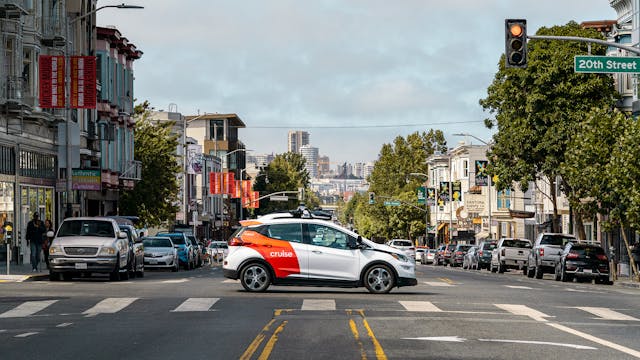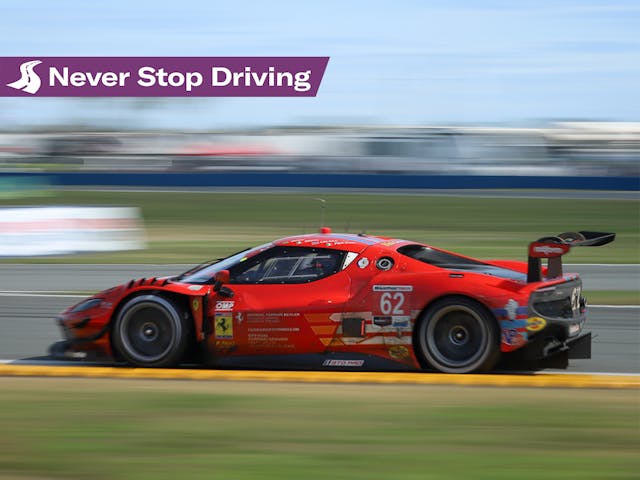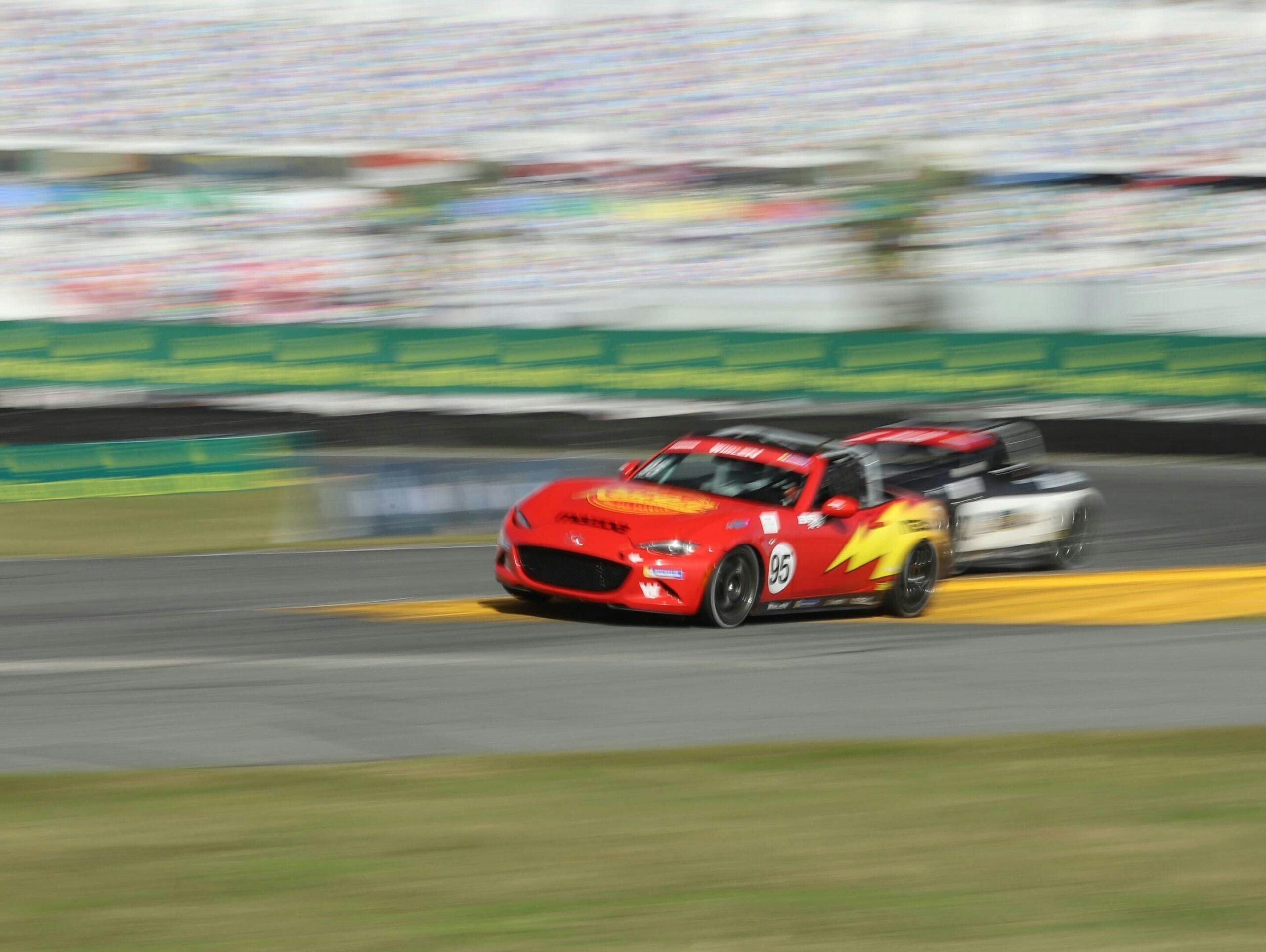Media | Articles
Never Stop Driving #84: Human and Robot Drivers
I was exhausted just watching portions of last weekend’s 24 Hours of Daytona. Endurance races used to be ho-hum wars of attrition with drivers circulating at reduced speeds to keep their cars alive, but nowadays, they’re closer to 24-hour sprint races. At Daytona’s 20-hour mark, the top six cars were within four seconds of each other!
One small, fatigue-induced error, like an improperly tightened wheel nut, could have caused a car to drop out of contention, so you can imagine the pressure on drivers and crews to perform flawlessly for 24 continuous hours. (I get tired after simply loading my race car onto a trailer.) As I explained last week, sports car racing is enjoying a new golden period thanks to renewed interest from car manufacturers, whose investments have helped ratchet up reliability, durability, and overall performance.
In the top GTP class, a Porsche fielded by Roger Penske took the overall win, a popular result. A Ferrari 296 run by Houston-based Risi Competizione won the GTD Pro class, and a Mercedes triumphed in the amateur GTD class. There were many interesting storylines that my colleague Steve Cole Smith, who was at Daytona, detailed here.
Marketplace
Buy and sell classics with confidence
While Daytona is the most well-known January race, the Indy Autonomous Challenge (IAC), held a couple of weeks earlier, was equally interesting. This series uses identical open-wheel race cars outfitted with various sensors and actuators for autonomous operation. That’s right: no human beings behind the wheel, just teams of college students who program the robot drivers.
The most recent IAC competition was held at Las Vegas Speedway during CES. The driverless race cars circulated at up to 150 mph and even executed passes at that lofty speed and at night without the track lights illuminated. The team from the Technical University of Munich in Germany won, with the University of Virginia placing second. I still have PTSD from hours of mind-numbing lectures during my engineering studies, so I’m a huge fan of these real-life student competitions as alternative teaching methods. For a good IAC primer, check out this video.

IAC is a reminder that despite recent hiccups in autonomous car development—GM just announced that it is slashing Cruise’s budget by $1 billion—the technology will nonetheless continue to improve. Waymo, for example, is pressing on and announced that it will soon expand its Phoenix-based driverless taxi service to include highways. I wonder when, if ever, those robot drivers will be able to handle the mean streets around NYC.
In the meantime, Hagerty Media has plenty of fresh material to entertain and inform you this weekend. Please be sure to sign up for our newsletters and subscribe to our YouTube and social channels. Some of this week’s highlights include:
- The unknown designer who penned many of GM’s greatest hits
- Jason Cammisa schools Jay Leno on the VW Scirocco
- We analyzed the car market after the January auctions
- Mazda improved one of my favorite cars, the Miata
- Hagerty’s Davin Reckow shows how to build a Ford V-8
- On this week’s podcast, auction expert Ramsey Potts details how to buy and sell a car. Listen on Apple, Spotify, and Youtube
Thanks for reading! If you’d like to support us, please share our material and join the Hagerty Drivers Club.
Have a great weekend!
-Larry
P.S.: Your feedback is very welcome. Comment below!
Please share this newsletter with your car-obsessed friends and encourage them to sign up for the free weekly email. The easy-to-complete form is here. And if you’d like to support the efforts of Hagerty Media, please consider joining the Hagerty Drivers Club.




















Autonomous Will improve but even like AI it is still far from perfect and plus there will be legal and moral issues to resolve.
The cars will be given how to react by a programer. That being the case would he chose to do what you chose to do.
The dilemma I read about is like a car driving in a case where it may hit a child on a bike or go over a cliff. Who makes that call. Then who is legally responsible for the results.
We have just started to see this with the lawsuits that are now beginning.
I am working with AI on things at work now with a tech company. Some of it works well some of it works poorly as the AI lacks context at this point. We have had to program in contect to make it understand the things we need it to learn. It will get better but still not ready yet.
The legal issues will be take case by case to set a path they will follow.
Sound comments. Context is the key, I would think. We have long had programs that do “if…or…else” but having context to aid those kinds of difficult decisions is crucial for a well-run AI to return meaningful results.
I believe we as a society fixate on the “Gee Whizz!” when there are all manner of decisions an AI could AIDE in the resolution of, making coming to a decision much faster AND more likely to be moral and legal.
Many of us have loved racing for a long, long time. I’ve personally crewed for several friends running Formula V’s, and held up signs for a 956 at Daytona back before radio comms. I also ran a 100cc enduro kart in the upper Mid-West for some 5 years.
I’m 77 and have looked into running a race car. But age and frailty prevent doing so easily. What I HAVE found is sim racing. I have just about finished my sim racer, reminding myself of my old rule, “you build every race car twice – once the way YOU think it should go and once the way THEY think it should go. It ends up being something in between.
In the mean time, I have learned a great deal about sim racing. First of all, it id quite widespread. There are guys racing from console games (XBox, PlayStation) all the way to what I chose to do – dedicated rig. Some pretty famous drivers run sim races (Verstappen, Alonso, Magnusen – to just name a few). Some have even published uTube videos on seat position, triple screen location to get the most from the wide view, etc.
Some will argue it’s just a game. It is a lot more. iRacing allows you to adjust individual tire pressure, castor, camber, toe-in (front & rear), shock fast and slow conpression AND rebound, ride height, aero effect – the list goes on. These changes have real effects on how the car behaves on the track.
Like real racing, it isn’t cheap. $1500 for chassis/seat, $2,000 for pedals/dd wheel hub, pedals, wheel, say $2000 for a decent triple screen (OR QUALITY VR headset. If you choose carefully, you can get paddle tabs for clutch on the wheel, obviating the need for a stick and clutch. Else you’ve added about $6-700 (or more) to your cost. Thing is, these things don’t break, so you don’t wreck real sheet metal when you crash. And you PERSONALLY aren’t at physical risk. You can do anything in this “car” you can do on a track – except wreck a million dollar race car or do your body physical harm that’s hard or impossible to recover from.
Yet you never mention it. It IS a part of “driving” or “racing” You’ve talked – a little – about karts, an OUTSTANDING WAY (esp enduro karts) of learning the dynamics of driving fast, how—to improve, etc. But nothing on sims. I submit that is a blind spot for you. Just try it – on a decent rig. You’ll love it.
Larry, I also watched quite a few hours of the race, toggling between NBC and USA Networks. I did recall a comment one of the broadcasting team made, that the cars these days are expected to finish the race, and to your pint, the drivers and support members are the ones enduring. This aspect of the sport has shifted from the mechanical to the human factor more so than in the past.
I just keep coming back to “I want your clothes, your boots and your motorcycle”.
Regarding autonomous vehicles: my software engineer daughter – a car geek who did a stint at an autonomous vehicle start-up – told me she didn’t expect to see true L5 autonomy in her lifetime. As she said, the environment will remain too complex and too unpredictable until massive improvements to computing power and miniaturization occur.
As I begin this journey towards retirement , I am looking for a clearing house for shows , driver trips and get togethers. Do we have a clearing house ?